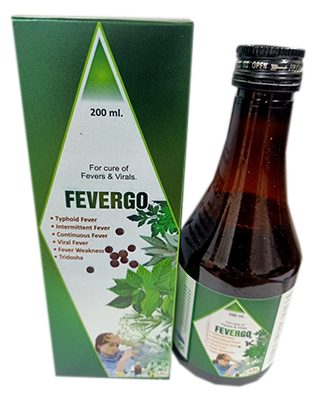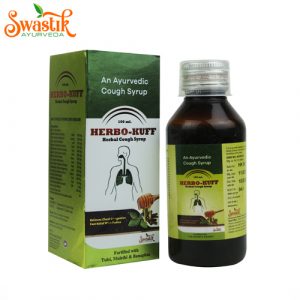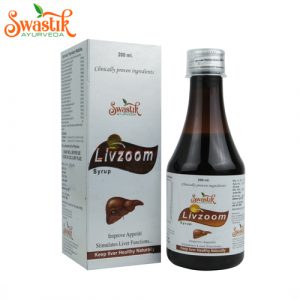- Working Days/Hours: 9:30-7:30
- +91-9780917734
- sales5swastik@gmail.com
Ayurvedic Antipyretic Syrup – Fever-Go Syp is a widely used over-the-counter antipyretic medicine that helps in treating fever and pain in both children and adults. The medicine helps in decreasing typhoid fever, intermittent fever, continuous fever, viral fever, fever weakness, and tridosha. It prohibits the release of prostaglandins, the chemical responsible for pain and an increase in body temperature. The medicine can be used without prescription but if it is advised by your doctor, consume it in the proper dose and duration. You can take the medicine with or without food but prefer taking it after food. Let your doctor know in advance if you have a liver or kidney problem.
Ingredients List of Ayurvedic Syrup for Fever & Virals
- Papita 600mg
- Tulsi 300mg
- Giloy 300m
- Anaar (Fr.) 150mg
- Anaar (Br.) 150mg
- Arjun Chaal 300mg
- Dashmool 300mg
- Ashwangandha 150mg
- Satavari 150mg
- Haldi 150mg
- Aloevera 150mg
- Jivanti 150mg
- Neem 150mg
- Sugar Q.S.
Packaging
Our Herbal Antipyretic tonic is available in 200ml bottle packaging in the carton pack.
Advantages of Ayurvedic Antipyretic Syrup
This ayurvedic syrup is an antipyretic medicine that is used in the treatment of fever in various conditions like:
- Viral fever
- Typhoid fever
- Fever weakness
- Intermittent fever
- Continuous fever
- Tridosha
Key Ingredients
Papita
Papita has medicinal properties and acts as an antibacterial and antifungal. It decreases inflammation and boosts immunity that helps to fight a fever.
Tulsi
Tulsi contains antipyretic and diaphoretic properties that aid in the induction of perspiration and the normalisation of high body temperature during fever. Its leaves can be used to decrease fever since their Rasayana (rejuvenating) properties assist to boost immunity and combat infection.
Giloy
Giloy detoxifies the body, cleanses the blood, and fights germs. It has an antipyretic effect, which means it can lower fever and alleviate the symptoms of life-threatening fevers.
Anaar
Anaar/pomegranates contain antioxidants including tannins, anthocyanins, and ellagic acid. The seeds of this plant are a nutritional powerhouse. To keep our cells healthy and able to fight infections and inflammation, we need antioxidants, it also helps to keep organs from becoming damaged.
Arjun Chaal
Due to its antipyretic properties, Arjun chaal may be used to treat fever and reduce body temperature. It also has analgesic effects that help decrease fever-associated discomfort.
Dashmool
Dashamoola is an excellent analgesic, antipyretic, and temperature-lowering remedy for a variety of fevers because of its unique combination of active ingredients. It works against fever caused by the common cold, flu, or influenza as well as intermittent and high fever.
Haldi
Turmeric promotes mucus production, which naturally removes germs that block the respiratory tract. While turmeric’s antiviral and antibacterial qualities can aid in the battle against infection, its anti-inflammatory activity aids in the relief of cough and cold symptoms.
Dosage and Storage
- It is generally used as required. If you miss a scheduled dosage, take it as soon as remember but do not double the amount to accommodate.
- Keep your medications in a cold, dry location, away from the sink, stove, and other hot appliances.
- The medicine is safe for children but keep it out of their reach to avoid miss-consumption.
Side Effects
The medication is safe to consume and has no adverse effects. However, please notify your doctor if you have any of the following symptoms:
- Indigestion
- Vomiting
- Diarrhoea
- Nausea
- Stomach pain, etc.
Frequently Asked Questions
What is Ayurvedic Antipyretic Syrup?
Ayurvedic Antipyretic Syrup is a herbal remedy used to reduce fever and manage associated symptoms like headache, body aches, and fatigue. It is formulated with a blend of Ayurvedic herbs known for their antipyretic, analgesic, and anti-inflammatory properties.
What are the ingredients of Ayurvedic Antipyretic Syrup?
The specific ingredients of Ayurvedic Antipyretic Syrup may vary depending on the brand or formulation. However, some common ingredients include:
-
Guduchi (Tinospora cordifolia): A well-known Ayurvedic herb with antipyretic, anti-inflammatory, and immune-boosting properties.
-
Kutki (Picrorhiza kurroa): An Ayurvedic herb with antipyretic, anti-inflammatory, and hepatoprotective properties.
-
Vacha (Acorus calamus): An Ayurvedic herb with antipyretic, analgesic, and antispasmodic properties.
-
Tulsi (Ocimum sanctum): An Ayurvedic herb with antipyretic, anti-inflammatory, and adaptogenic properties.
How does Ayurvedic Antipyretic Syrup work?
Ayurvedic Antipyretic Syrup works by reducing the production of prostaglandins, which are molecules that contribute to fever and inflammation. It also helps to regulate the body’s temperature control mechanisms and enhance immune function.
What are the benefits of using Ayurvedic Antipyretic Syrup?
Ayurvedic Antipyretic Syrup offers several potential benefits, including:
-
Reduces fever: It effectively lowers body temperature and helps manage fever-related symptoms.
-
Alleviates headache and body aches: It provides relief from headache, muscle aches, and joint pain associated with fever.
-
Boosts immunity: It strengthens the immune system’s ability to fight off infections and reduce the duration of illness.
-
Safe and natural: It is generally considered safe for most individuals and is free from the side effects often associated with conventional antipyretic medications.
Who should use Ayurvedic Antipyretic Syrup?
Ayurvedic Antipyretic Syrup is suitable for individuals of all ages, including children and adults, to manage fever and associated symptoms. However, it is advisable to consult with an Ayurvedic practitioner or healthcare professional before using it, especially if you have any underlying health conditions or are taking any medications.
How much Ayurvedic Antipyretic Syrup should I take?
The recommended dosage of Ayurvedic Antipyretic Syrup may vary depending on age, weight, and individual health conditions. It is generally recommended to follow the directions on the product label or consult with an Ayurvedic practitioner for personalized dosage recommendations.
How long can I take Ayurvedic Antipyretic Syrup?
The duration of use of Ayurvedic Antipyretic Syrup typically depends on the severity of fever and the overall response to the treatment. It is generally recommended to continue taking it until the fever subsides and symptoms improve.
Are there any side effects associated with Ayurvedic Antipyretic Syrup?
Ayurvedic Antipyretic Syrup is generally considered safe and well-tolerated. However, in rare cases, it may cause mild side effects such as mild gastrointestinal discomfort or skin rash. If you experience any adverse reactions, discontinue use and consult with an Ayurvedic practitioner or healthcare professional.
| PACKING | 200ml |
|---|






